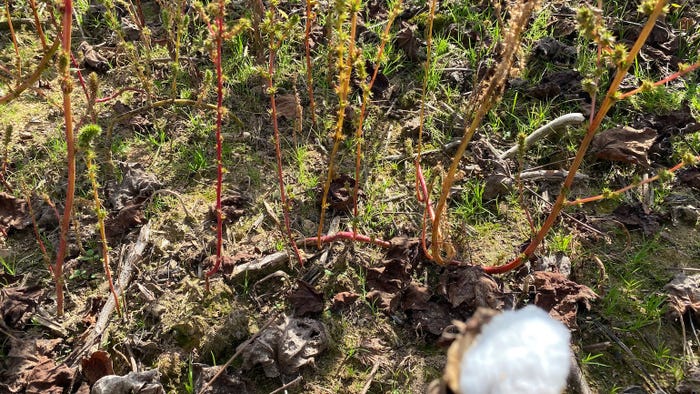The snow-white cotton field could be picture perfect, except for one large swath of brown and green. It’s not a defoliation issue. It’s Palmer pigweed.
“Probably here we had a few mother plants that went to seed last year that had ramped up tolerance to auxin herbicides,” said Larry Steckel, University of Tennessee Extension weed specialist. “Now we have problems.”
Steckel circles the nearly one-acre patch of 2 - 3-foot pigweed, pointing out how many of the plants are bent near the ground where they were hit with a timely dicamba application, but have branched out around the damage and flourished. He said the farmer of this field told him multiple applications of dicamba and glyphosate went out this summer.
“In this case it was dicamba, but we’re seeing it with 2,4-D as well, and we’re seeing it across more fields in west Tennessee.”
After what seemed like a reprieve from Palmer amaranth for the 2016-2018 crop seasons, seeing large populations of pigweed retuning to fields with a vengeance is startling, and Steckel says it’s catching some farmers off guard.
“Dicamba and 2,4-D have worked pretty good on pigweeds until really last year. So, farmers go out timely, spraying the 4 – 6-inch pigweeds, and they’re not coming back for 20-25 days. They expect to spray a new flush of pigweeds, but to their horror, they discover the first flush is still present. And at that point the Palmer is practically bulletproof.”

What can farmers do?
Dicamba-resistant Palmer amaranth populations are present in Tennessee field, according to research done by Steckel and colleagues at other universities. In the past 26 years, Palmer amaranth has become resistant to five herbicide modes of action in Tennessee.
“The math would indicate that weed would evolve resistance to an effective herbicide in just a little over five years of widespread use,” Steckel said.
While Steckel said resistance is not found in every field, it’s apparent tolerances are trending upwards. Now is the time to scout fields and start planning weed control for 2021. For fields with large escapes in 2020, producers will have few opportunities to control the pigweeds.

“When it gets to this stage, where it’s starting to top a couple acres of a good-sized field, next year that seed is going to be everywhere. So, you’ve got to try to put your thumb on it as best you can this year in the affected, as well as being careful not to spread it to other fields. Cleaning equipment is very important,” Steckel said.
“On these really bad fields we’ve got to start thinking about next year’s crop, and the first thing that comes to my mind is corn. However, if you’re going back to cotton, use those pre-emergence herbicides and try to overlay them as best you can.
“When you do have some break and have to come back with a post don’t just assume that first glyphosate-dicamba shot is going to control them this year when it didn’t last year. Don’t wait 20 days. Shorten that interval and come back with Liberty or dicamba and try to stomp them before they get their feet back under them.”
About the Author(s)
You May Also Like






